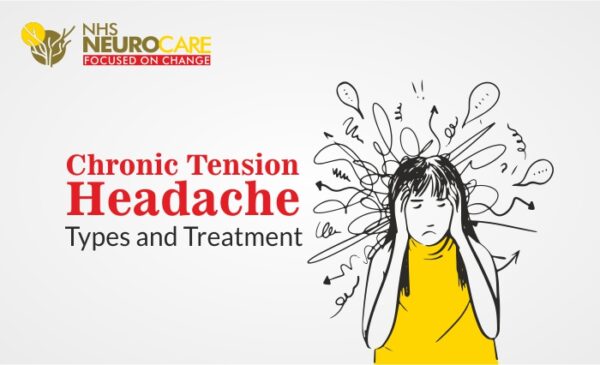Chronic Tension headache Types and Treatment
When can you say your tension headache is Chronic?
Tension headache is the most common form of headache felt across the forehead as a band of pain and if it lasts for at least 15 days every month for three months then it is called a chronic tension headache, which means it is persistent. The severity of such chronic tension headaches may vary from mild to severe.
When can you experience a chronic tension headache?
Working long hours on the computer, excess consumption of caffeine (coffee) or alcohol, inadequate consumption of water, the long interval between meals, or may be due to reading in low light for long periods.
What does a tension headache feel like?
- Uncomfortable and tiring pain
- Occurs on both sides involving the neck (spreading to the neck)
- Interrupt concentrations while working
- Can last from 30 minutes to 7 days
- Mild in the morning and becomes severe as the day progresses.
- Being averse to bright lights or loud noises
- Anxiety or depression due to persistent headaches.
What can be done to have relief from such persistent headaches?
Painkillers such as paracetamol, aspirin, and other anti-inflammatory painkillers are useful to relieve pain. Meanwhile, avoid all triggering factors such as bright light that may cause eye strain, caffeinated drinks, chocolate, cheese, and alcohol. Low intake of refined sugars and a healthy balanced diet split into small amounts at periodic intervals. Stress is also one of the major triggers, hence better to avoid stressful situations as much as possible. In an inevitable scenario, such as workplace stress, some relaxation and breathing exercises or other coping strategies as advised by the psychologist or your doctor might help to overcome stress.
Are there any medications to prevent Chronic tension headaches (CTH)?
The aim of preventive treatment is not only to reduce the number of headaches but also the severity. Amitriptyline is the most commonly used anti-depressant medicine that can help prevent CTH. A dose up-titration needs to be done which means starting with low doses of Amitriptyline and increasing over time as per the requirement and dose-response of the patient. Once the patient is relieved of headaches for at least 4-6 months due to Amitriptyline, the treatment can be discontinued. In case the patient achieves tolerance to Amitriptyline is not effective, then upon the advice of the doctor, try new medications. Some of the other medications that are effective in Amitriptyline-refractory patients are Topiramate
(generally used for migraine), Gabapentin (used for tingling and neuropathic pain), and Tizanidine (used for muscle spasms).
Are there any ways other than medicines, to help prevent Chronic tension headaches?
Indirectly by preventing stress, one can prevent chronic tension headaches. Techniques such as biofeedback training and relaxation therapy can help.
Biofeedback training – control certain body responses that help reduce pain. During a biofeedback session, you’re connected to devices that monitor and give you feedback on body functions such as muscle tension, heart rate, and blood pressure. Based on the feedback, one can reduce muscle tension and focus more on breathing.
Cognitive behavioral therapy. manage stress and may help reduce the frequency and severity of your headaches.
Other relaxation techniques. Deep breathing, yoga, meditation, and progressive muscle relaxation, may help you relieve stress and prevent headaches.
Conclusion
Healthy lifestyle practices such as adequate sleep, hydration, regular exercise, a regular balanced diet in small periodic intervals, and refrainment from smoking, alcohol, caffeine, and sugar may help prevent chronic tension headaches.
Headaches are best treated at the onset of the initial symptoms. Our experts at NHS Neuro Care can assist you in seeking relief from headaches. We will assist you in determining the root of your headaches and will provide appropriate pain management treatments. To ensure long-term efficacy, we will develop a tailored treatment plan that will involve lifestyle modifications, medication, and other therapies (if required).

